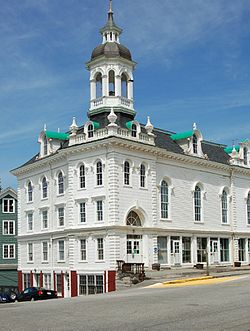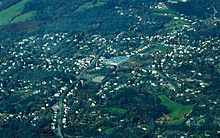North Brookfield, Massachusetts
North Brookfield, Massachusetts | |
|---|---|
 North Brookfield Town Hall | |
| Nickname: NB | |
 Location in Worcester County and the state of Massachusetts. | |
| Coordinates: 42°16′00″N 72°05′00″W / 42.26667°N 72.08333°W | |
| Country | United States |
| State | Massachusetts |
| County | Worcester |
| Settled | 1664 |
| Incorporated | 1812 |
| Government | |
| • Type | Open town meeting |
| • Administrative Assistant | Leslie Scott Burton |
| • Board of Selectmen | Dale Kiley, Jason Petraitis, John Tripp |
| Area | |
• Total | 21.7 sq mi (56.3 km2) |
| • Land | 21.1 sq mi (54.5 km2) |
| • Water | 0.7 sq mi (1.7 km2) |
| Elevation | 915 ft (279 m) |
| Population (2020) | |
• Total | 4,735 |
| • Density | 220/sq mi (84/km2) |
| Time zone | UTC-5 (Eastern) |
| • Summer (DST) | UTC-4 (Eastern) |
| ZIP code | 01535 |
| Area code | 508 / 774 |
| FIPS code | 25-47135 |
| GNIS feature ID | 0618377 |
| Website | northbrookfield |
North Brookfield is a town in Worcester County, Massachusetts, United States. The population was 4,735 at the 2020 census.[1] The town includes the census-designated place of North Brookfield (CDP).
History
North Brookfield was first settled in 1664 and was officially incorporated in 1812, splitting from neighboring Brookfield.
The town's lands were formerly a part of the Quaboag Plantation.[2]
Geography
According to the United States Census Bureau, the town has a total area of 21.7 square miles (56 km2), of which 21.1 square miles (55 km2) are land and 0.7 square miles (1.8 km2), or 3.04%, is water. North Brookfield is bounded on the east by Spencer, on the south by East Brookfield and Brookfield, on the west by West Brookfield, and on the north by New Braintree. The junction of North Brookfield, Spencer and New Braintree is also shared by the town of Oakham; however, Brooks Pond cuts that point, as well as two others, off from the rest of the town.
Demographics
| Year | Pop. | ±% |
|---|---|---|
| 1850 | 1,939 | — |
| 1860 | 2,760 | +42.3% |
| 1870 | 3,343 | +21.1% |
| 1880 | 4,459 | +33.4% |
| 1890 | 3,871 | −13.2% |
| 1900 | 4,587 | +18.5% |
| 1910 | 3,075 | −33.0% |
| 1920 | 2,610 | −15.1% |
| 1930 | 3,013 | +15.4% |
| 1940 | 3,304 | +9.7% |
| 1950 | 3,444 | +4.2% |
| 1960 | 3,616 | +5.0% |
| 1970 | 3,967 | +9.7% |
| 1980 | 4,150 | +4.6% |
| 1990 | 4,683 | +12.8% |
| 2000 | 4,708 | +0.5% |
| 2010 | 4,680 | −0.6% |
| 2020 | 4,735 | +1.2% |
| 2022* | 4,728 | −0.1% |
| * = population estimate. Source: United States census records and Population Estimates Program data.[3][4][5][6][7][8][9][10][11][12][13] | ||

As of the census[14] of 2000, there were 4,683 people, 1,811 households, and 1,235 families residing in the town. The population density was 222.3 inhabitants per square mile (85.8/km2). There were 1,902 housing units at an average density of 90.3 per square mile (34.9/km2). The racial makeup of the town was 97.65% White, 0.34% Black or African American, 0.26% Native American, 0.21% Asian, 0.36% from other races, and 1.17% from two or more races. Hispanic or Latino of any race were 1.09% of the population.
There were 1,811 households, of which 33.3% had children under the age of 18 living with them, 53.5% were married couples living together, 10.8% had a female householder with no husband present, and 31.8% were non-families. 25.8% of all households were made up of individuals, and 11.4% had someone living alone who was 65 years of age or older. The average household size was 2.55 and the average family size was 3.09.

In the town, the population was spread out, with 27.2% under the age of 18, 7.0% from 18 to 24, 29.4% from 25 to 44, 23.4% from 45 to 64, and 12.9% who were 65 years of age or older. The median age was 37 years. For every 100 females, there were 96.4 males. For every 100 females age 18 and over, there were 92.9 males.
The median income for a household in the town was $44,286, and the median income for a family was $51,750. Males had a median income of $37,647 versus $30,324 for females. The per capita income for the town was $20,205. About 4.1% of families and 5.5% of the population were below the poverty line, including 7.8% of those under age 18 and 5.0% of those age 65 or over.
Government
| State government | |
|---|---|
| State Representative(s): | Donnie Berthiaume (R) |
| State Senator(s): | Anne M. Gobi (D) |
| Governor's Councilor(s): | Paul DePalo (D) |
| Federal government | |
| U.S. Representative(s): | James P. McGovern (D-2nd District), |
| U.S. Senators: | Elizabeth Warren (D), Ed Markey (D) |


Library
The North Brookfield public library was established in 1879.[15][16] In fiscal year 2008, the town of North Brookfield spent 0.84% ($92,958) of its budget on its public library—approximately $19 per person, per year ($23.27 adjusted for inflation in 2021).[17]
Education
There are two public schools in North Brookfield, North Brookfield Elementary School, serving grades K–6, and North Brookfield Junior-Senior High School. The school system is one of the smallest in the region, as almost all nearby towns of similar size joined regional districts.
The private Valley View School and Mad Brook Academy are also located in North Brookfield.
Points of interest
- Town Hall
- First Congregational Church of North Brookfield
- Long View Farm recording studios
Notable people
- Tryphosa Bates-Batcheller (1876–1952), writer, socialite and singer
- Bill Bergen, National League baseball player with the Cincinnati Reds and the Brooklyn Dodgers, younger brother of Marty Bergen
- Marty Bergen, Boston Beaneaters player, triple murderer
- William Cullen Bryant poet, journalist and editor of the New York Evening Post
- George M. Cohan, entertainer, playwright, composer, lyricist, actor, singer, dancer, director
- Frank Cooke, optics designer and manufacturer
- "Big" Al Downing, country and rockabilly musician
- William Cary Duncan (1874–1945), playwright and author[18]
- Abbie M. Gannett (1845–1895), essayist, poet and philanthropist
- Robert B. Groat (1888–1959), Printer, publisher, and politician
- Richard B. Johnson, author of Abominable Firebug (ISBN 0-595-38667-9) which details his childhood in North Brookfield, attending the "Yellow School" across from the "Asbestos Shop." Later he writes about the Lyman School for Boys, the reform school he attended
- Amasa Walker, Economist, United States Representative and father of Francis Amasa Walker
- Francis Amasa Walker, economist, statistician, journalist, educator, president of MIT, and military officer in the Union Army
References
- ^ "Census - Geography Profile: North Brookfield town, Worcester County, Massachusetts". United States Census Bureau. Retrieved November 12, 2021.
- ^ "Brief History of Quaboag Plantation". West Brookfield Historical Society. Retrieved February 28, 2014.
- ^ "Total Population (P1), 2010 Census Summary File 1". American FactFinder, All County Subdivisions within Massachusetts. United States Census Bureau. 2010.
- ^ "Massachusetts by Place and County Subdivision - GCT-T1. Population Estimates". United States Census Bureau. Retrieved July 12, 2011.
- ^ "1990 Census of Population, General Population Characteristics: Massachusetts" (PDF). US Census Bureau. December 1990. Table 76: General Characteristics of Persons, Households, and Families: 1990. 1990 CP-1-23. Retrieved July 12, 2011.
- ^ "1980 Census of the Population, Number of Inhabitants: Massachusetts" (PDF). US Census Bureau. December 1981. Table 4. Populations of County Subdivisions: 1960 to 1980. PC80-1-A23. Retrieved July 12, 2011.
- ^ "1950 Census of Population" (PDF). Bureau of the Census. 1952. Section 6, Pages 21-10 and 21-11, Massachusetts Table 6. Population of Counties by Minor Civil Divisions: 1930 to 1950. Retrieved July 12, 2011.
- ^ "1920 Census of Population" (PDF). Bureau of the Census. Number of Inhabitants, by Counties and Minor Civil Divisions. Pages 21-5 through 21-7. Massachusetts Table 2. Population of Counties by Minor Civil Divisions: 1920, 1910, and 1920. Retrieved July 12, 2011.
- ^ "1890 Census of the Population" (PDF). Department of the Interior, Census Office. Pages 179 through 182. Massachusetts Table 5. Population of States and Territories by Minor Civil Divisions: 1880 and 1890. Retrieved July 12, 2011.
- ^ "1870 Census of the Population" (PDF). Department of the Interior, Census Office. 1872. Pages 217 through 220. Table IX. Population of Minor Civil Divisions, &c. Massachusetts. Retrieved July 12, 2011.
- ^ "1860 Census" (PDF). Department of the Interior, Census Office. 1864. Pages 220 through 226. State of Massachusetts Table No. 3. Populations of Cities, Towns, &c. Retrieved July 12, 2011.
- ^ "1850 Census" (PDF). Department of the Interior, Census Office. 1854. Pages 338 through 393. Populations of Cities, Towns, &c. Retrieved July 12, 2011.
- ^ "City and Town Population Totals: 2020-2022". United States Census Bureau. Retrieved November 10, 2023.
- ^ "U.S. Census website". United States Census Bureau. Retrieved January 31, 2008.
- ^ C.B. Tillinghast. The free public libraries of Massachusetts. 1st Report of the Free Public Library Commission of Massachusetts. Boston: Wright & Potter, 1891. Google books
- ^ Haston Free Public Library. Retrieved November 10, 2010
- ^ July 1, 2007, through June 30, 2008; cf. The FY2008 Municipal Pie: What's Your Share? Commonwealth of Massachusetts, Board of Library Commissioners. Boston: 2009. Available: Municipal Pie Reports Archived January 23, 2012, at the Wayback Machine. Retrieved August 4, 2010
- ^ "WILLIAM C. DUNCAN, WRITER OF MUSICALS". The New York Times. November 22, 1945. p. 33.
Further reading
- Temple, Josiah Howard; Adams, Charles, History of North Brookfield, Massachusetts: Preceded by an account of old Quabaug, Indian and English occupation, 1647–1676; Brookfield records, 1686–1783, Pub. by the town [Boston, printed], 1887



